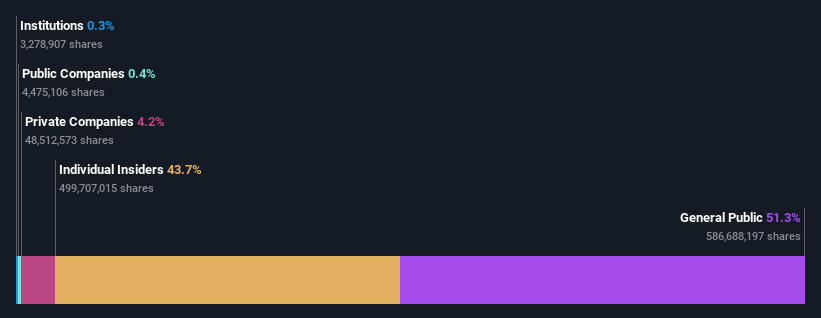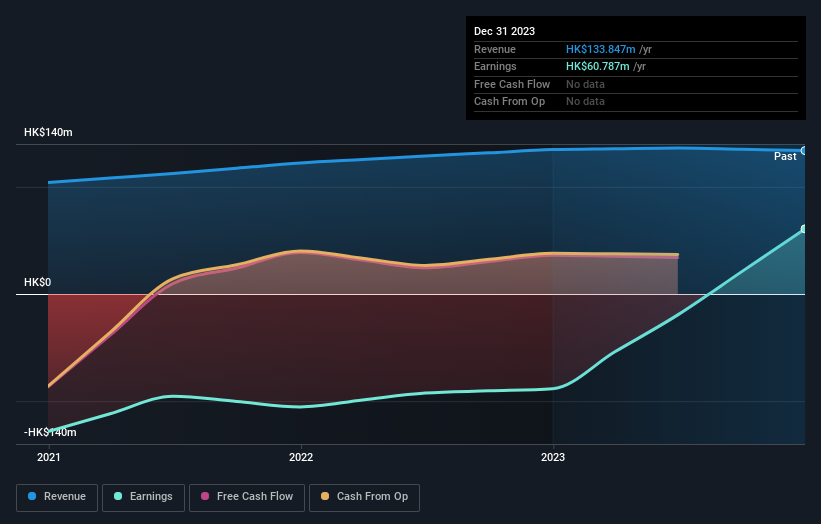- Hong Kong
- /
- Hospitality
- /
- SEHK:1221
Retail investors are Sino Hotels (Holdings) Limited's (HKG:1221) biggest owners and were hit after market cap dropped HK$206m

Key Insights
- Sino Hotels (Holdings)'s significant retail investors ownership suggests that the key decisions are influenced by shareholders from the larger public
- 49% of the business is held by the top 5 shareholders
- 44% of Sino Hotels (Holdings) is held by insiders
A look at the shareholders of Sino Hotels (Holdings) Limited (HKG:1221) can tell us which group is most powerful. And the group that holds the biggest piece of the pie are retail investors with 51% ownership. Put another way, the group faces the maximum upside potential (or downside risk).
While the holdings of retail investors took a hit after last week’s 10% price drop, insiders with their 44% also suffered.
In the chart below, we zoom in on the different ownership groups of Sino Hotels (Holdings).
Check out our latest analysis for Sino Hotels (Holdings)

What Does The Lack Of Institutional Ownership Tell Us About Sino Hotels (Holdings)?
We don't tend to see institutional investors holding stock of companies that are very risky, thinly traded, or very small. Though we do sometimes see large companies without institutions on the register, it's not particularly common.
There are many reasons why a company might not have any institutions on the share registry. It may be hard for institutions to buy large amounts of shares, if liquidity (the amount of shares traded each day) is low. If the company has not needed to raise capital, institutions might lack the opportunity to build a position. Alternatively, there might be something about the company that has kept institutional investors away. Institutional investors may not find the historic growth of the business impressive, or there might be other factors at play. You can see the past revenue performance of Sino Hotels (Holdings), for yourself, below.

Hedge funds don't have many shares in Sino Hotels (Holdings). Our data suggests that Chee Siong Ng, who is also the company's Top Key Executive, holds the most number of shares at 44%. When an insider holds a sizeable amount of a company's stock, investors consider it as a positive sign because it suggests that insiders are willing to have their wealth tied up in the future of the company. Estate of Ng Teng Fong is the second largest shareholder owning 4.2% of common stock, and Tsim Sha Tsui Properties Limited holds about 0.4% of the company stock.
On studying our ownership data, we found that 5 of the top shareholders collectively own less than 50% of the share register, implying that no single individual has a majority interest.
While it makes sense to study institutional ownership data for a company, it also makes sense to study analyst sentiments to know which way the wind is blowing. As far as we can tell there isn't analyst coverage of the company, so it is probably flying under the radar.
Insider Ownership Of Sino Hotels (Holdings)
The definition of company insiders can be subjective and does vary between jurisdictions. Our data reflects individual insiders, capturing board members at the very least. Management ultimately answers to the board. However, it is not uncommon for managers to be executive board members, especially if they are a founder or the CEO.
I generally consider insider ownership to be a good thing. However, on some occasions it makes it more difficult for other shareholders to hold the board accountable for decisions.
Our most recent data indicates that insiders own a reasonable proportion of Sino Hotels (Holdings) Limited. It has a market capitalization of just HK$1.8b, and insiders have HK$780m worth of shares in their own names. It is great to see insiders so invested in the business. It might be worth checking if those insiders have been buying recently.
General Public Ownership
The general public -- including retail investors -- own 51% of Sino Hotels (Holdings). This size of ownership gives investors from the general public some collective power. They can and probably do influence decisions on executive compensation, dividend policies and proposed business acquisitions.
Private Company Ownership
Our data indicates that Private Companies hold 4.2%, of the company's shares. Private companies may be related parties. Sometimes insiders have an interest in a public company through a holding in a private company, rather than in their own capacity as an individual. While it's hard to draw any broad stroke conclusions, it is worth noting as an area for further research.
Next Steps:
It's always worth thinking about the different groups who own shares in a company. But to understand Sino Hotels (Holdings) better, we need to consider many other factors. For instance, we've identified 2 warning signs for Sino Hotels (Holdings) (1 is a bit unpleasant) that you should be aware of.
Of course this may not be the best stock to buy. Therefore, you may wish to see our free collection of interesting prospects boasting favorable financials.
NB: Figures in this article are calculated using data from the last twelve months, which refer to the 12-month period ending on the last date of the month the financial statement is dated. This may not be consistent with full year annual report figures.
New: Manage All Your Stock Portfolios in One Place
We've created the ultimate portfolio companion for stock investors, and it's free.
• Connect an unlimited number of Portfolios and see your total in one currency
• Be alerted to new Warning Signs or Risks via email or mobile
• Track the Fair Value of your stocks
Have feedback on this article? Concerned about the content? Get in touch with us directly. Alternatively, email editorial-team (at) simplywallst.com.
This article by Simply Wall St is general in nature. We provide commentary based on historical data and analyst forecasts only using an unbiased methodology and our articles are not intended to be financial advice. It does not constitute a recommendation to buy or sell any stock, and does not take account of your objectives, or your financial situation. We aim to bring you long-term focused analysis driven by fundamental data. Note that our analysis may not factor in the latest price-sensitive company announcements or qualitative material. Simply Wall St has no position in any stocks mentioned.
About SEHK:1221
Sino Hotels (Holdings)
An investment holding company, operates and manages hotels in Hong Kong.
Excellent balance sheet very low.

